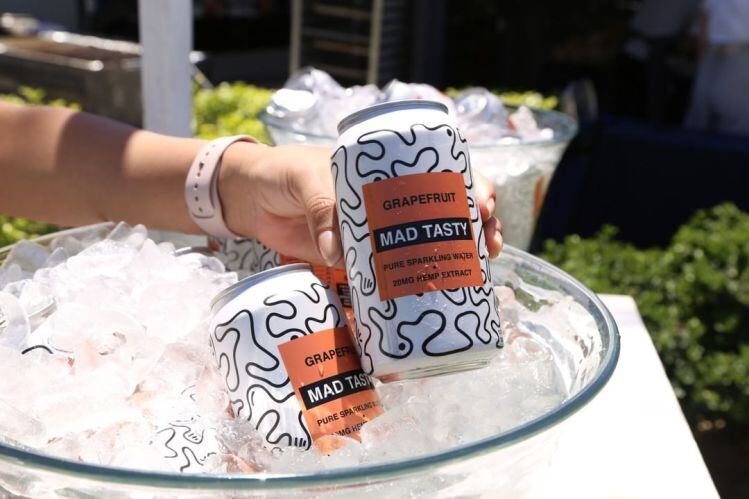SōRSE has developed proprietary techniques to produce liquid and powdered emulsions for specialty ingredients, but also offers formulation and production support, product development, licensing, and white label production services (via a network of preferred co-manufacturers that brand partners can work with to produce finished foods and beverages).
It sources cannabis extracts (it works both with industrial hemp-derived extracts and marijuana-derived extracts with more THC) from trusted partners and works with co-manufacturers that produce emulsions - using its proprietary technology – that can remain stable in finished products for more than 12 months.
SōRSE emulsions are currently in around 30 products, including a new line of beverages from startup Mad Tasty, which is backed by private equity fund First Bev (which houses Essentia water and Health-Ade Kombucha).
To find out more about formulation challenges and trending applications, FoodNavigator-USA (FNU) caught up with Michelle Sundquist, director of innovation and product design (who has developed multiple new beverage lines for Starbucks); and Mike Schmitt, technical project manager, who has worked at firms including Kerry, Wilcox Farms, Darigold, and Dohler North America.
FNU: Is there a one size fits all emulsion beverage brands can drop into a product, or does each application require a different approach?
Mike: We have three different weighted emulsions for beverages as you need to make sure that the emulsion is appropriate for the density of the product. So some customers might be making sparkling seltzers without any added sugars where the Brix [a measure of the dissolved solids such as sucrose in a liquid ] is nearly zero.
But when you have a [more sugary product such as] cola or a root beer or a juice or something like that with a higher Brix, the density changes, so you have to make sure the density of the emulsion changes too or you could end up with [the CBD oil] slicking out or ringing at the top of the bottle.
We need to understand our customers’ needs in the final product form, but we also need to understand what kind of pasteurization process companies are using [HPP, hot fill, aseptic, heat tunnel, flash pasteurization, etc etc], and these questions have to be asked up front so we can make sure that our process works - not just with the formulation [of the beverage in question] - but also the process it’s going to go through.
Michelle We’ve exposed the product [the emulsion] to high temperatures in baked goods and it remains stable.
FNU: Do other ingredients that companies may add to CBD-infused beverages – vitamins, minerals, botanicals etc - interfere with the CBD in the emulsion?
Michelle: There’s very little that interacts with the CBD or THC so you can pretty much add anything.
FNU: What are you using as an emulsifier?
Michelle: I can’t give you any details on that as we’re filing a patent on our process. [However, the company stresses that it takes a “clean label approach, using safe ingredients that are commonly found and widely accepted in the food industry.”]
FNU: What are you looking for when sourcing extracts?
Mike: We went through about 60 different suppliers and only five met our overall criteria. We’re not just looking at the extract itself – the cannabinoid profiles and THC content and so on; we go back to the plant mass and how it’s being dried to look for things like mold; we also look at pesticide residues, heavy metals, mycotoxins, solvent residues and so on; we’ve really had to dig into the supply chain to be sure that our products are safe and meet our specifications.
FNU: What’s distinct about SōRSE emulsions?
Michelle: We’re trying to create a product that removes the stigma around cannabis and CBD and makes it more accessible and approachable by adding it to things that people consume every day, such as beverages.
We’re taking CBD [oil] and basically forcing it into water; that process also breaks up the oil into smaller particles [surrounded by water, which means the CBD effectively becomes water soluble and can be used in a beverage, for example. The smaller particle size also helps the particles stay suspended in a solution and speeds up the onset time so consumers are not waiting for hours after consuming a product before they start to feel any effects, she says].
Typically with our product the onset time is about 10-20 minutes with a peak at about an hour, although the longevity depends on the dose and the individual consumer.
We’re focusing on [ensuring] stability in multiple different applications, but also on homogeneity [so the CBD is distributed uniformly, ensuring even dispersion throughout the final product].
FNU: What products are you working on?
Mike: We’ve been asked to put CBD in everything from gummies and tortillas to sachets of instant tea and sparkling flavored waters.
FNU: How is regulatory uncertainty surrounding CBD impacting the market [The FDA says CBD is not a legal dietary ingredient in foods and supplements, although certain states have explicitly authorized the sale of CBD-infused ingestible products]?
Michelle: The inconsistency is causing a lot of anxiety, and retailers are not sure if they will get in trouble if they sell these products, while consumers are confused. We work with entrepreneurs [that have already launched products] and we’re working with large beverage companies with names that are nationwide that want to develop products today so they are ready for when the federal government sets out a regulatory framework.
FNU: How much R&D and formulation work can you reasonably do during a lockdown?
Michelle: The majority of our company is working from home right now, but we’re still super busy as I think many consumers see CBD as something that could be part of their wellness programs [during a highly stressful time].


